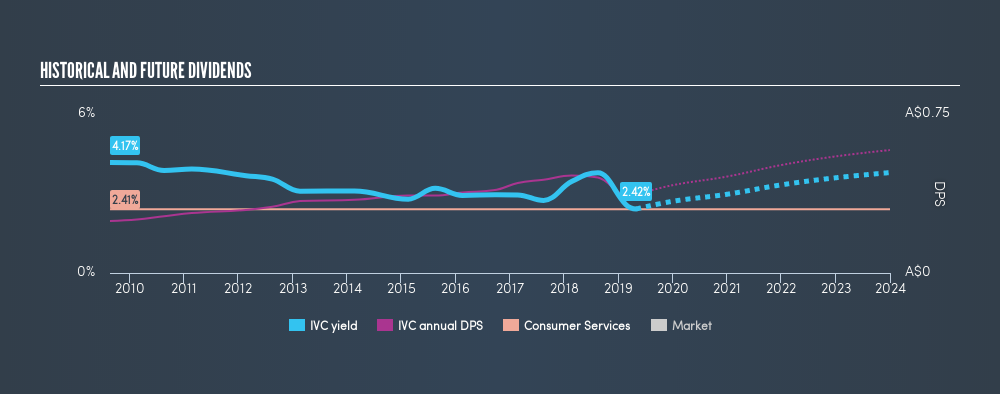- Australia
- /
- Consumer Services
- /
- ASX:IVC
Investors In InvoCare Limited (ASX:IVC) Should Consider This, First

Want to participate in a short research study? Help shape the future of investing tools and you could win a $250 gift card!
Today we'll take a closer look at InvoCare Limited (ASX:IVC) from a dividend investor's perspective. Owning a strong dividend company and reinvesting the dividends is widely seen as an attractive way of growing your wealth. Unfortunately, one common occurrence with dividend companies is for investors to be enticed in by the seemingly attractive yield, and lose money when the company has to cut its dividend payments.
A slim 2.4% yield is hard to get excited about, but the long payment history is respectable. At the right price, or with strong growth opportunities, InvoCare could have potential. The company also bought back stock during the year, equivalent to approximately 0.9% of the company's market capitalisation at the time. Before you buy any stock for its dividend however, you should always remember Warren Buffett's two rules: 1) Don't lose money, and 2) Remember rule #1. We'll run through some checks below to help with this.
Click the interactive chart for our full dividend analysis
Payout ratios
Companies (usually) pay dividends out of their earnings. If a company is paying more than it earns, the dividend might have to be cut. So we need to be form a view on if a company's dividend is sustainable, relative to its net profit after tax. Looking at the data, we can see that 98% of InvoCare's profits were paid out as dividends in the last 12 months. This is quite a high payout ratio that suggests the dividend is not well covered by earnings.
We also measure dividends paid against a company's levered free cash flow, to see if enough cash was generated to cover the dividend. Last year, InvoCare paid a dividend while reporting negative free cash flow. While there may be an explanation, we think this behaviour is generally not sustainable.
Is InvoCare's Balance Sheet Risky?
As InvoCare's dividend was not well covered by earnings, we need to check its balance sheet for signs of financial distress. A quick way to check a company's financial situation uses these two ratios: net debt divided by EBITDA (earnings before interest, tax, depreciation and amortisation), and net interest cover. Net debt to EBITDA is a measure of a company's total debt. Net interest cover measures the ability to meet interest payments on debt. Essentially we check that a) a company does not have too much debt, and b) that it can afford to pay the interest. InvoCare has net debt of more than 3x its EBITDA, which is getting towards the limit of most investors' comfort zones. Judicious use of debt can enhance shareholder returns, but also adds to the risk if something goes awry.
We calculated its interest cover by measuring its earnings before interest and tax (EBIT), and dividing this by the company's net interest expense. Interest cover of less than 5x its interest expense is starting to become a concern for InvoCare, and be aware that lenders may place additional restrictions on the company as well.
Remember, you can always get a snapshot of InvoCare's latest financial position, by checking our visualisation of its financial health.
Dividend Volatility
From the perspective of an income investor who wants to earn dividends for many years, there is not much point buying a stock if its dividend is regularly cut or is not reliable. InvoCare has been paying dividends for a long time, but for the purpose of this analysis, we only examine the past 10 years of payments. Its dividend payments have fallen by 20% or more on at least one occasion over the past ten years. During the past ten-year period, the first annual payment was AU$0.24 in 2009, compared to AU$0.37 last year. Dividends per share have grown at approximately 4.2% per year over this time. InvoCare's dividend payments have fluctuated, so it hasn't grown 4.2% every year, but the CAGR is a useful rule of thumb for approximating the historical growth.
We're glad to see the dividend has risen, but with a limited rate of growth and fluctuations in the payments, we don't think this is an attractive combination.
Dividend Growth Potential
Given that the dividend has been cut in the past, we need to check if earnings are growing and if that might lead to stronger dividends in the future. In the last five years, InvoCare's earnings per share have shrunk at approximately 3.3% per annum. If earnings continue to decline, the dividend may come under pressure. Every investor should make an assessment of whether the company is taking steps to stabilise the situation.
Conclusion
To summarise, shareholders should always check that InvoCare's dividends are affordable, that its dividend payments are relatively stable, and that it has decent prospects for growing its earnings and dividend. InvoCare paid out almost all of its cash flow and profit as dividends, leaving little to reinvest in the business. Second, earnings per share have been in decline, and its dividend has been cut at least once in the past. Using these criteria, InvoCare looks quite suboptimal from a dividend investment perspective.
Companies that are growing earnings tend to be the best dividend stocks over the long term. See what the 8 analysts we track are forecasting for InvoCare for free with public analyst estimates for the company.
If you are a dividend investor, you might also want to look at our curated list of dividend stocks yielding above 3%.
We aim to bring you long-term focused research analysis driven by fundamental data. Note that our analysis may not factor in the latest price-sensitive company announcements or qualitative material.
If you spot an error that warrants correction, please contact the editor at editorial-team@simplywallst.com. This article by Simply Wall St is general in nature. It does not constitute a recommendation to buy or sell any stock, and does not take account of your objectives, or your financial situation. Simply Wall St has no position in the stocks mentioned. Thank you for reading.
About ASX:IVC
InvoCare
InvoCare Limited provides funeral, cemetery, crematoria, and related services in Australia, New Zealand, and Singapore.
Reasonable growth potential with mediocre balance sheet.
Market Insights
Community Narratives





